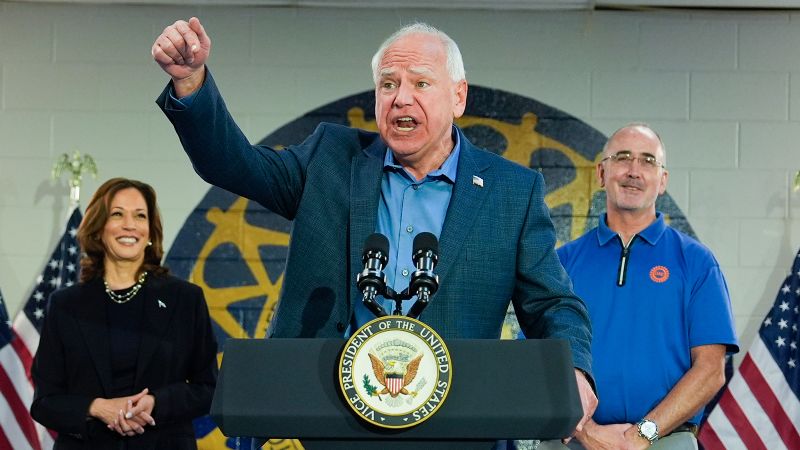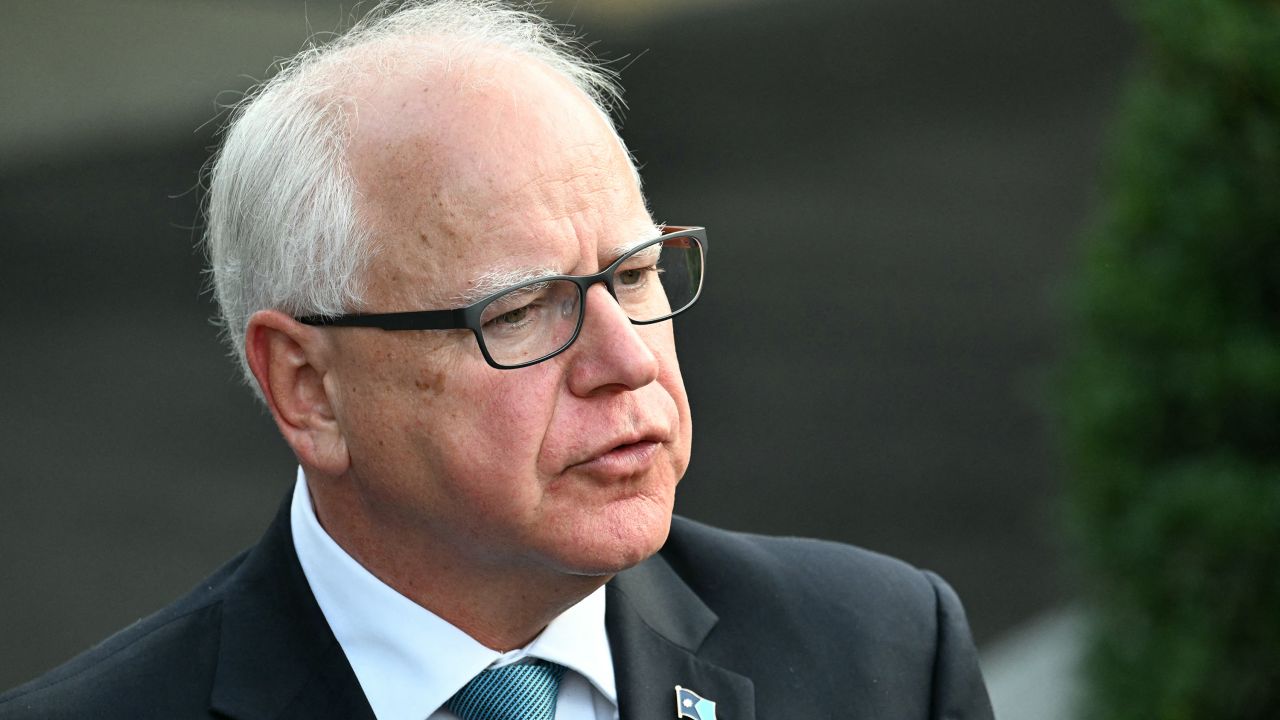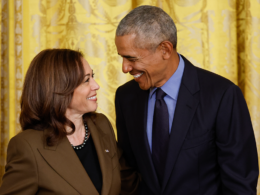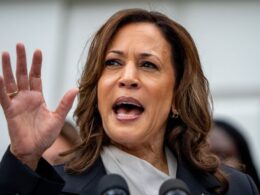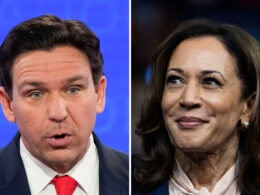Hong Kong
CNN
—
Presumptive Democratic presidential nominee Kamala Harris’ running mate has a decades-long connection with China. But in the eyes of Beijing, that may not necessarily be good news.
Tim Walz moved to China fresh out of college in 1989 to teach high school for a year, and then frequently returned to the country during a decade of taking American students on summer cultural exchanges.
The 60-year-old Minnesota governor has spoken fondly of his time in China and the people he met there, and his familiarity with the country and empathy for its people bring a personal, nuanced perspective on the United States’ biggest strategic rival that is rare among his political peers.
Some Republican opponents have seized on that experience to accuse Walz of being “pro-China,” but the Democratic vice-presidential nominee has a long history of criticizing authoritarian Chinese leadership.
Walz moved to China at a tumultuous and politically charged time, shortly after the Tiananmen Square massacre, when the ruling Communist Party sent tanks in to violently quell peaceful student-led democracy protests in Beijing. Upon returning home to Nebraska in 1990, he told a local newspaper he felt the Chinese people had been mistreated by their government for years.
“If they had the proper leadership, there are no limits on what they could accomplish. They are such kind, generous, capable people,” he told the Star-Herald at the time.
During his time in Congress from 2007 to 2019, Walz rallied support for imprisoned Chinese activists. He met with the Dalai Lama, the exiled Tibetan spiritual leader loathed by Beijing, and Joshua Wong, the young Hong Kong democracy activist now jailed for his activism against Beijing’s tightening grip.
“The more he understands China, the more he feels pity for the Chinese people, and the more critical he becomes of the rulers who govern them,” said Shen Dingli, a foreign policy analyst in Shanghai.
“He has some understanding of Chinese culture and respects it in his heart, but he definitely does not accept China’s political (system),” Shen added. “Beijing is probably more fearful and uncomfortable with such a foreigner who understands China.”
‘It was more about the people’
Walz was among the first groups of young Americans to teach in high schools in China under a Harvard University volunteer program, just a decade after the two countries established diplomatic relations.
As a fresh graduate, he spent a year teaching English and American history at the Foshan No. 1 High School, in the southern province of Guangdong.
There, he was met with industrious and welcoming students who applauded him each time he used a Chinese word correctly, and friendly strangers who offered to help whenever he stopped in the streets looking bewildered, he told the Star-Herald in 1990.
“I was treated exceptionally well,” he told the newspaper. “There was no anti-American feeling whatsoever. American is ‘It’ in the eyes of the Chinese. Many of the students want to come to America to study.”
That was a different era in China. The impoverished country was curious about the world after emerging from decades of self-imposed isolation and tumultuous rule under Mao Zedong. Paramount leader Deng Xiaoping unleashed market reforms and, along with an economic opening, calls for political liberalization gathered pace in the 1980s.
Such calls coalesced into a student-led movement in the spring of 1989, which was brutally put down by the Chinese military weeks before Walz’s trip.
“I remember waking up and seeing the news on June 4 that the unthinkable had happened,” Walz told Voice of America in an interview in 2014.
“Many of my colleagues decided to go home and not to go on [to China]. I thought it was more important than ever to go, to make sure the story was told and to let the Chinese people know we were standing there, we were with them.”
From Guangdong, Walz took a 40-hour cross-country train ride to the Chinese capital to see Tiananmen Square, the site of the democracy protests.
He made sure he would always commemorate the crackdown in a personal way – by getting married on June 4, 1994, the fifth anniversary of the massacre.
“He wanted to have a date he’ll always remember,” his wife and fellow high-school teacher, Gwen, told a local newspaper in Minnesota before their wedding.
The newlyweds spent their honeymoon taking students on two-week tours in China for sightseeing and classes on culture, education and history. These trips became a summer tradition for the couple through 2003.
“I would go back in a heartbeat,” said Cara Roemhildt, who went on such a trip in 1998. “It was an educational trip with one of our favorite teachers. It was more about the people. It wasn’t about the politics.”
Roemhildt said she and her classmates still talk about the trip decades later.
“It felt very, very comfortable. And we went all over…Train rides (to) a whole bunch of different places,” she told CNN. “Just seeing a different culture and having respect for it while seeing it. Knowing that it’s different, but knowing that it’s okay, too.”

A nuanced critic
After entering politics in 2006, Walz continued to devote time and attention to China in Congress.
He served more than a decade on the Congressional-Executive Commission on China, which monitors human rights and the rule of law in the country – a role Beijing would not be happy about.
“The Chinese government has always viewed that commission as ‘anti-China,’” said Liu Dongshu, an assistant professor of public and international affairs at the City University of Hong Kong.
In Congress, Walz co-sponsored a series of resolutions calling on China to release its jailed rights activists, including Nobel Peace laureate Liu Xiaobo, who eventually died in custody of liver cancer.
In 2015, Walz joined a congressional delegation on a trip to China, which included a rare stop in Tibet, which he had also visited decades earlier during his time teaching at the Chinese high school.
The following year, Walz met the Dalai Lama in Washington for what he called a “ life-changing lunch.” He also welcomed Lobsang Sangay, then leader of Tibet’s government in exile, into his congressional office to meet a group of Minnesota high-school students.
At a congressional meeting that year, he called on Beijing to “ensure the preservation of traditional Tibetan culture” and “provide less regulated religious freedom to the Tibetans.”
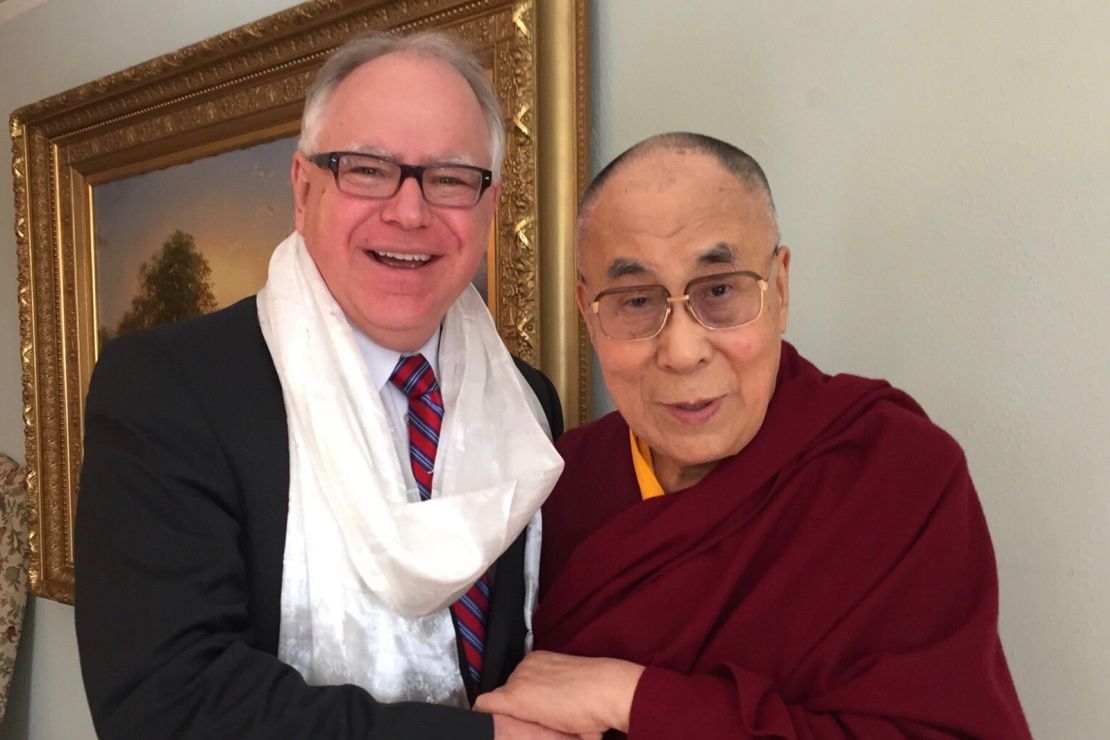
Walz has also been a vocal supporter of Hong Kong’s pro-democracy movement.
In 2017, when Wong, the student protest leader, was jailed for his political activism, Walz posted a photo of himself and the young activist standing side by side to show solidarity with “all advocating for democracy in Hong Kong.”
Walz also threw his support behind the Hong Kong Human Rights and Democracy Act, which sanctions officials responsible for human rights violations in the city, when the legislation appeared to be languishing in Congress.
“We knocked on every door when the #HKHRDA lacked momentum. Only Walz answered his,” Jeffrey Ngo, a Hong Kong democracy activist now based in Washington, said on X.
“Walz is perhaps the most solid candidate when it comes to human rights and China on a major-party ticket in recent memory,” Ngo said.
On the diplomatic front, Walz has criticized China’s unfair trade practices and its growing assertiveness in the South China Sea.
In Chinese nationalist circles, which have an outsized voice on policy debates in China, there are no rosy illusions about Walz.
“On human rights and ideological issues, he has basically crossed all the possible red lines out there,” Shen Yi, an international relations scholar known for his fiercely nationalistic views, wrote on social media.
But unlike more hawkish politicians, Walz does not believe in decoupling, and instead holds a more nuanced view on the geostrategic rivalry between the US and China.
“I don’t fall into the category that China necessarily needs to be an adversarial relationship. I totally disagree,” he said in an interview in 2016.
“We’re on the same sheet of music, two of the world’s great superpowers, there’s many collaborative things we can do together.”
Stephen Roach, former chief of Morgan Stanley Asia, said the Harris-Walz ticket may provide “an important counterweight to the current venom of American Sinophobia.”
Walz’s empathy for the Chinese people and appreciation of China’s non-political aspects make him a harder case for Beijing to “villainize as an ‘anti-China’ foil” than politicians that are hawkish on all dimensions, Eric Fish, a former Beijing-based journalist and author of “China’s Millennials: The Want Generation,” said on X.
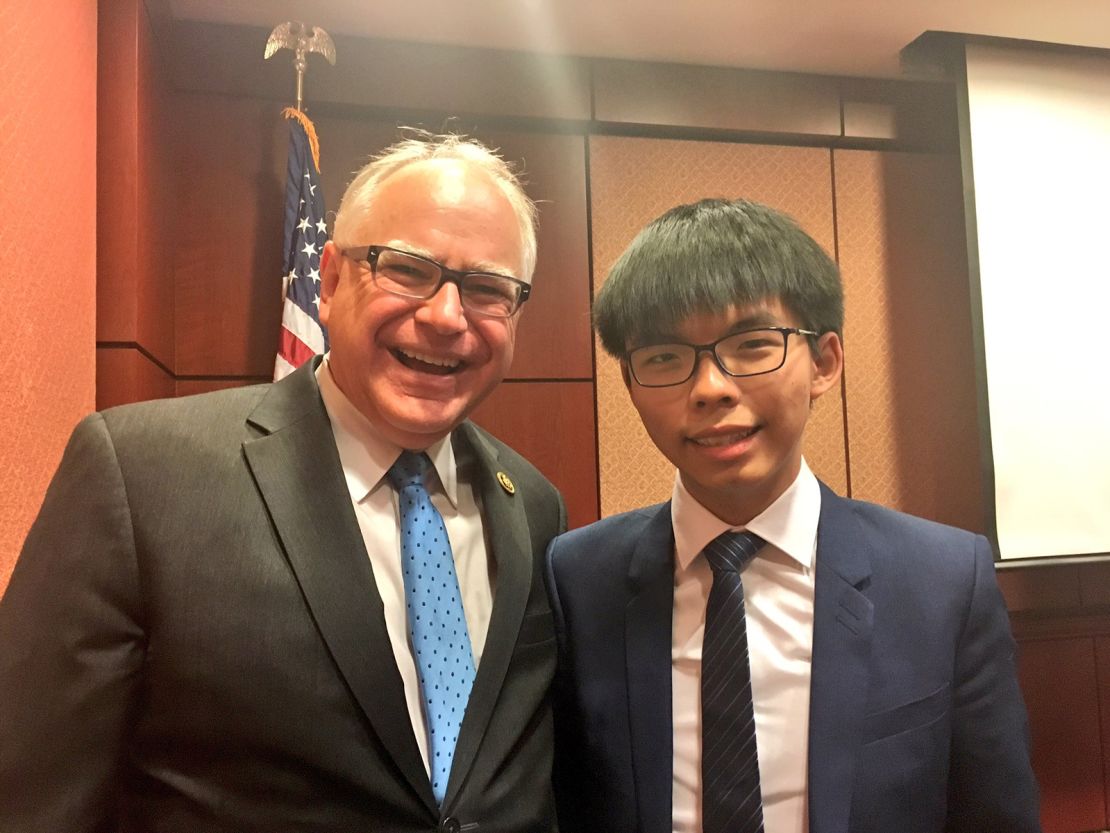
‘A complex country’
Walz’s extensive experience with China makes him a rare figure in the race for the White House – at least since George H. W. Bush, who served as America’s unofficial ambassador to Beijing in the mid-1970s before running for vice president and later president.
Bush’s stint in Beijing would go on to influence his foreign policy – and help steer US-China relations through the tumultuous fallout of the Tiananmen crackdown.
But US-China relations are at a very different place now from the honeymoon period of engagement. Being tough on China has become a rare point of bipartisan consensus in the US, and Beijing is unlikely to be counting on Walz to improve bilateral ties.
“The direction of US policy towards China is very clear. As an individual, regardless of your attitude towards China, there’s not much room for maneuver,” said Liu, the expert at the City University of Hong Kong.
“And vice presidents can have a varied level of say in foreign policy, depending on the president they serve,” he added.
Walz’s experience living and teaching in China could serve as a useful diplomatic ice breaker to warm up the room if that’s what the two sides wish to do, Liu said. But even then, he added, the Chinese would need to dance around the awkwardness in the timing and avoid all mention of the Tiananmen crackdown – which remains a political taboo in China.
On China’s tightly controlled social media, Walz’s early ties to the country have raised eyebrows and generated considerable interest. The hashtag “Harris’ VP pick once taught in China” racked up 15 million views on microblogging site Weibo.
The year of Walz’s arrival in China – 1989 – was not lost among those who understand the sensitivity of the date, despite decades of effort by the Chinese government to erase the brutal crackdown from public memory.
But, perhaps reflective of the different era China now finds itself in under leader Xi Jinping, who has fanned nationalist sentiment and suspicion against foreigners over national security, many questioned the “real motive” of Walz’s first trip to China.
“Heh, 1989-1990, Americans teaching in China during this period – it’s something worth pondering carefully,” said a top comment on Weibo.
“Must be a spy,” said another.
Liu said that, given how drastically China has changed over the past decades, Walz’s understanding of the country from his younger days may offer limited help on American policy toward China today.
Walz himself has conceded that he’s by no means a China expert.
“I lived in China, and as I said I’ve been there about 30 times,” he said in the 2016 interview. “But if someone tells you they’re an expert on China, they’re probably not telling you the truth because it’s a complex country.”




